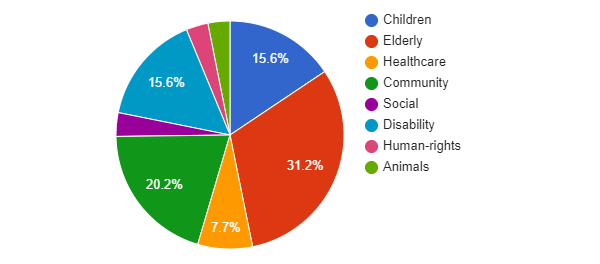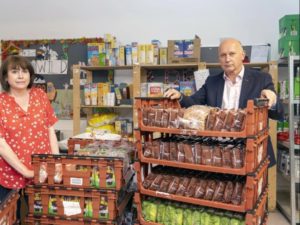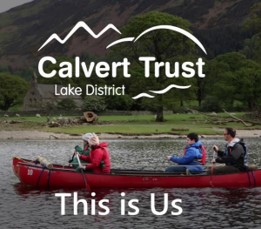In this newsletter we’re sharing stories about; the importance of food banks in Wakefield and how they provide access to food to families in need. We share about Kendal Torchlight Carnival who would appreciate your support to enable them to keep their Carnival running for the 52nd year! IIC interviews Thrive Law and Jodie Hill to discuss Social Value and how their sector gets involved. And we also hear from one of our fantastic Ambassadors Johnny Pawlik!
An interview with Jodie Hill – Founder and Managing Partner of Thrive Law:
You are taking the lead on measuring, tracking, and recording your social value impact through our platform – what led to this decision and is it ingrained in your company cultures and values?
We have been supporting local community initiatives around us for some time and helping specific charities in the mental health space, but we weren’t monitoring our activity. We had no record of what we were doing and how much time we were spending on our voluntary work across the business at all. As a business we are quite data driven and we wanted to know how many hours we give to our community and recording the ways that we help people was important as well as understanding more about the impact we were having through the work we are doing.
We have always run events and helped support others through our contacts, but we have never had a formal process on what sort of charities we were going to support and why. I wanted everyone to be involved, so during a team day everyone chucked in their charities and initiatives they wanted to be involved with and we took all those names and placed them on a board (anonymously) and then voted on them as a team. We decided on how we are going to help the charities, and would it be as teams or individuals and how often would we be helping. The Investors in Community platform would then come in to play and let us know who had worked on what, where had they done it and what time was given to each charity or community initiative and has now helped formalise the process we were looking for and not just about how much money we can make each project but what impact were we genuinely giving back to our community.

I also like the individual perspective on the platform and how it can transfer from organisations because each person can be doing way more on their own accord but included it as part of that system. I know it’s a personal preference and each employee needs to be encouraged at times to help give back, but they have a choice to work within the team or do something independently which says something about that person and it’s good to see the work they do over and above the work at Thrive.
I don’t think people realise how much they do themselves and if you sit down and recall all the time they do give to charities in terms of time. Many of the team will do a walk or charity run and I’m a champion for LawCare which is a mental health charity for Lawyers and support Leeds MIND with pro bono training and advice to name just a few, and found we don’t think to put down our time for all the charity work we do and now I can already think of 10 different charities I do give my time to and that is adding real value but isn’t recorded anywhere.
Is it fair to say that most law firms don’t really value time given to generating social impact when time is all about chargeable hours?
As a law firm we don’t have a billable hours target. What we do have is behavioural links to an overall target. This drive the important of the right behaviours. Its not just about what money lawyer bill but about the value they add more widely. For example, some of team some may not have billed loads of hours that week or month, but they will have added value somewhere else in the business or completed their charity work. To Thrive Law its more about what a person brings as their whole value as a person rather than being a billing machine. In our 1:1s every month we have our behavioural scores but with the platform we can now monitor their behaviour on an annual basis too and looking back over the year we will now have another layer of data showing what value that individual brings. We offer a free helpline service to different charities and free advice from legal to non-legal and helping the homeless and it would be good to see where we are spending most of our time in these areas. Our culture is more about being a team player rather than as an individual and if you do meet your financial target for the month but not demonstrated any additional contribution then over the year your score will affect your overall results. The conventional way in a law firm would be based on your billable hours and which clients you had brought in. That’s not how we do it and law firms have to think differently in this new age. Thrive Law is a business and yes, we are here to make money, but we are also here to make a difference, to give back and want to add value to the wider society.
Thrive Law is a business with purpose, and we want to attract the right employees and the right clients. For us its more about driving our purpose and values rather than just being a law practice delivering on the letter of the law. At Thrive Law People Matter.
There are other firms out there that do a lot on social impact, but the consensus is that the focus is on billable hours. It’s a personal view but there larger the firm the more the value of the deal takes over from the purpose and it becomes a culture view. Do I want to work with a firm that puts purpose first or is it about making a millionaire more millions first?
‘People can’t put food on the table without help’ – Wakefield district’s food banks are asking you to give them your support.
Food Bank support has declined over the past eight months but the need for their service has increased. That’s according to Community Foundation Wakefield, which has started a new fundraising drive to help the district’s 35 food banks put food on people’s plates.
Lisa Grant, the manager of St Catherine’s Church food bank in Wakefield, said it had been a tough time for people in need. She said: “Demand has definitely increased. We are seeing a lot of families who have been made redundant or on furlough so have seen a dip in income. For most of our clients it is crucial that they get to the food bank because they have no means of buying food after the bills are paid – they are flat broke. We have more families coming to us who are absolutely desperate. Some of the kids just wouldn’t eat without getting help.”
Lisa said people who would often donate have been going into to shops less and people in general are being more careful with money.
She said: “Everyone is worried about different things but food banks are not going away. I would love to see the day they all shut down because there was no need for them but that’s not going to happen anytime soon.”

Wakefield BID is working with Community Foundation Wakefield and Investors in Community on the project. Business Development Director Dave Clarkson said: “The Investors in Community platform is the most effective way of connecting organisations, individuals, charities, and community groups to show that by working together powerful and evidenced social impact can be created. As food banks have grown it is noted that the shelves have become half empty, food donations have declined over the past eight months. It’s not only food donations and volunteering that is required, but there is also the financial cost of running these services. This is the campaign we wish to highlight, and monetary donations are needed to keep each of these services running right throughout the year.”
The past 18 months of pandemic meant food banks had to face new challenges. The national lockdown over the winter in particular brought little respite for food banks. Volunteers had to learn new ways to distribute food to meet social distancing guidelines while continuing to rely of the public’s kindness to keep their shelves stocked. Food banks reported record numbers of people needing help throughout 2020.
The Trussell Trust, which supports a network of food banks around the county, said 2,600 emergency food parcels were provided for children every day on average by its food banks during the first six months of the pandemic alone. And there were countless example of citizens taking matters into their own hands to help others.
Wakefield teenager Megan Rodd launched her own food bank and supported hundreds of people every week since the start of the first lockdown. Schools held collections for food banks and people stepped up to deliver vital supplies.
Search Investors in Community Wakefield food banks for a page where you can donate.
Kendal Torchlight Carnival Needs Your Help!
“By the people, for the people” – Torchlight History.

Kendal Torchlight Carnival started in 1970 and has almost always been held on the Friday following the Westmorland County Show in September.
Torchlight content has varied over the years from just 30 float entries in the beginning to over 130 floats, bands, carnival and dance troupes and other artists at its peak and has always been a gathering for the people of Kendal and surrounding areas, for our visitors and guests – “A gathering for the town, for the surrounding areas, for everyone – people entertaining people!”
This year we need donations to help the Carnival run better than ever before!
Find out more about Kendal Torchlight Carnival here.
Check out what your donation can help them do:
- £1,000 pays for festoon lighting (pretty lightbulb strings) to help create a magical atmosphere in the park after dark.
- £800 pays for a band (5 musicians to play on our main stage). This will be our main headline band to play on Saturday afternoon in the market square. There are 5 musicians, keyboard, saxophone, trumpet, bass guitar, guitar. Due to covid they haven’t been able to perform.
- £50 will provide materials resources for community groups and schools to make an entry
- £100 would light 20 lanterns (£5 a lantern)
A Word From One Of Our Ambassadors, Johnny Pawlik:
“Many of us want to give and do more for our communities, to be a part of the solution, improving the lives of others and making our environments safer, happier, and more resilient. This is only possible when we work together under a common purpose. Investors In Community creates the space for that collaboration to take place, coalescing communities to constructively collaborate for the benefit of all.”
“I’m honoured to be an ambassador for the IIC because, like many others, I believe in leaving the world a little better than how I found it.”

I help ethics first organisations, driven by purpose and positive impact to competently and effectively brand and market themselves. I also help leaders to develop different ways of thinking, to engage with both macro and micro-level perspectives to create solutions for complex challenges.
Oxford-educated with over 21 years of international experience in branding, marketing, and strategy, I’ve had the opportunity to consult with the European Parliament, the Tokyo Metropolitan Government, British Members of Parliament, the NHS, the UKTI, and a plethora of others. I’ve been featured on Good Morning Britain, the BBC Political Debates, BBC Radio, Osaka Radio, Asahi Shimbun, and many others.
I’m the Founder and CEO of the international branding and marketing firm, Mantra Media, and the Co-Founder of the Japanese luxury retail brand, Atelier Japan. I like to keep connected and impactful outside of my day-to-day by giving my time to some incredible organisations, causes, and societies. I’m currently an Ambassador for (IIC) Investors in Community, a fellow of the Royal Society of Arts and Commerce, a Guest Chair for the Intelligence Forums, and a member of Deloitte’s Climate Action Coalition.
We thought we would share some amazing charities with you as well!
Barnabus
We empower and equip people experiencing homelessness back into independent living and a home through our street outreach, support centre, healthcare and resettlement tenancy scheme. Support them here

Sheffield Hospitals Charity
Helping local patients feel even better. With your support Sheffield Hospitals Charity can help to ensure patients receive outstanding treatment and care. Support them here.

Airplay Coningsby
Airplay at RAF Coningsby is funded by the RAF Benevolent fund to provide safe, supervised activities for children and young people from RAF Coningsby and the local community. Support them here

Leicester Animal Aid
Leicester Animal Aid is a rescue and rehoming centre for cats and dogs. Every year we care for around 400 animals that are lost, abandoned, unwanted or relinquished because their owners can no longer care for them. We provide care for up to 40 dogs and 30 cats at any one time. Support them here.

Join Investors In Community today to deliver your social impact and align with your purpose.





























